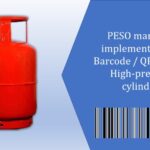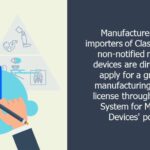The Department of Pharmaceuticals has notified the Uniform Code for Marketing Practices in Medical Devices (UCMPMD) 2024 (“Code”), mandating strict compliance obligations on medical device companies.
Key Highlights:
1. Claims and Comparisons
Claims about the usefulness of a medical device must be supported by available evidence and the device’s Instructions for Use (IFU) or Directions for Use (DFU). Terms like “safe” should not be used unqualified, and product claims must align with registration documents and user manuals. Comparisons between devices should be factual, fair, and substantiated, avoiding misleading distortions or omissions. Brand names of other companies should not be used in comparisons without consent, and disparaging remarks about other companies, their products, or healthcare professionals are prohibited.
2. Textual and Audio-Visual Promotion
Promotional materials issued by an authorized holder must adhere to the Code’s requirements, providing essential information such as the generic name and/ or brand names of the medical device, manufacturer and importer details, warnings, precautions, contraindications, a statement regarding the availability of additional information and the date of the information. These materials should not be designed to obscure their promotional nature, not mimic editorial content in paid publications and uphold good taste while respecting the professional standing of the recipients.
3. Medical Representatives
• The term “medical representative” means sales representatives, medical affairs or marketing professionals, clinical specialists including professional retained by way of contract with third parties or any other company representatives who call on healthcare professionals, pharmacies, pathology labs, hospitals and other healthcare facilities in connection with the promotion of Medical Devices.
• Medical representatives must uphold high ethical standards and adhere strictly to the Code in their duties, avoiding any form of inducement or payment for access to healthcare professionals. Companies are accountable for their employees’ adherence to the Code, which should be reflected in employment contracts. Additionally, third parties working with or on behalf of medical device companies must be well-informed about and comply with the Code’s provisions.
4. Brand Reminders
• Brand Reminders are permitted in the books, calendars, diaries, journals (including e-journals), dummy device models etc. for professional use in healthcare settings and do not exceed the Rs. 1000 per item or do not have commercial value. Brand reminders are also allowed in the form of evaluation samples, and, demonstration products.
• Evaluation samples of medical devices are provided solely to qualified healthcare professionals (HCPs) for hands-on experience, not exceeding a reasonable quantity for evaluation purposes. These samples must be handed directly to the HCP or an authorized representative, with the recipient’s details recorded. Each sample should include the latest product instructions and be marked “Evaluation Sample- Not for Sale.” Companies must keep detailed records of the samples, including the product name, HCP details, and distribution information, for at least five years. The total monetary value of such samples must not surpass two percent of the company’s annual domestic sales.
• Demonstration Products, distinct from Evaluation Samples, are designed for medical representatives to showcase medical devices to healthcare professionals (HCPs) for educational purposes and are not for patient use. These products, which can include single-use items, mock-ups, or temporary software, must be returned to the company after the demonstration and should be separately identified and tracked. Companies are required to keep detailed records of these products, including names, contact information, quantities, values, supply dates, and return dates for at least five years. Receipt of these products by HCPs does not imply endorsement or recommendation of the brand.
5. Continuing Medical Education
Continuing Medical Education (CME), Continuing Professional Development (CPD), and similar events must adhere to strict and transparent guidelines set by the medical device industry. These guidelines prohibit events from being held in foreign locations except when there is non-availability of trainers or equipment in the country. Companies are required to disclose event details and expenses on their websites, which are subject to audits. Similarly, organizers must provide transparent information about participant and speaker selection processes, funding sources, and expenses, also subject to audit.
6. Support for Research
To foster research and innovation collaboration between the pharmaceutical industry and academia, interactions between companies and healthcare professionals must adhere to certain guidelines:
• Research or studies must have approval from competent authorities like ICMR, DCGI, Ethics Committees, or Institutional Authorities, conducted at recognized sites or locations.
• Engagement of healthcare professionals in consultant-advisory roles should be for genuine research services under consultancy agreements, with consultancy fees or honorarium-based payments, ensuring compliance with relevant Income-Tax Act provisions and NMC regulations to maintain patient interests and professional integrity.
• Expenditure on research by pharmaceutical companies is allowed under the Income Tax Act, 1961, subject to amendments.
7. Relationship with Healthcare Professionals
• Gifts:
Medical Device companies, as well as their agents such as distributors, wholesalers, and retailers, are prohibited from offering or providing gifts for the personal benefit of any healthcare professional or their family members. Likewise, no monetary or non-monetary benefits may be offered, supplied, or promised to individuals qualified to prescribe or supply medical devices.
• Travel:
Companies, their representatives, or anyone acting on their behalf are prohibited from providing travel facilities, including transportation and accommodations, inside or outside the country, to healthcare professionals or their family members for attending conferences, seminars, workshops, etc., unless the individual is a speaker for a Continuing Medical Education (CME) or Continuing Professional Development (CPD) program.
• Hospitality:
Companies, their representatives, or anyone acting on their behalf are prohibited from offering hospitality such as hotel stays, expensive dining, resort accommodations, etc., to healthcare professionals or their family members unless the individual is a speaker for a Continuing Medical Education (CME) or Continuing Professional Development (CPD) program.
• Money Grant:
Companies or their representatives are strictly prohibited from providing cash or monetary grants to any healthcare professional or their family members, whether immediate or extended, under any circumstances or pretext.
8. Declarations
• Under the Code, the Chief Executive Officer of each company is responsible for ensuring compliance with the provisions of the Code. Additionally, within two months of the end of each financial year, the CEO is required to submit a self-declaration affirming compliance with the Code. This declaration must be submitted both to the pharmaceutical association for publication on their website and directly to the UCPMP Portal of the Department of Pharmaceuticals.
• Companies are required to provide a declaration outlining disclosures related to the distribution of free samples and expenses incurred for Continuing Medical Education (“CME”), Continuing Professional Development (“CPD”), conferences, workshops, training sessions, and seminars. It is specified that while companies must continuously update this information, a mandatory submission to the UCPMP portal is required within two months following the conclusion of each financial year.
9. Penalty
The Code authorizes the Committee to propose various sanctions against any company found in breach. These sanctions may include suspension or expulsion from the Association, issuance of a public reprimand with complete disclosure, requirement for a corrective statement in the same medium as the promotional material, demands for recovery of unlawfully obtained funds or items with a report back to the Committee, or forwarding recommendations to relevant governmental agencies through the Department of Pharmaceuticals for further legal action, if necessary.
A copy of the Code is linked below for your reference.
Source: Department of Pharmaceuticals





